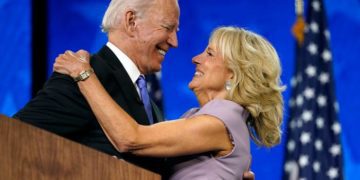[ad_1]
As the world grapples with unprecedented lockdown measures, Ai Weiwei finds himself in familiar territory. The outspoken artist spent nearly three months in a tiny room while detained by authorities in China in 2011.

A picture taken on May 16, 2019 shows a view of the “S.A.C.R.E.D” installation by Ai Weiwei at a retrospective of the artist’s work at K21 Kunstsammlung Nordrhein-Westfalen art museum in Duesseldorf, Germany. The dioramas in “S.A.C.R.E.D” (2013) depict the activist’s time in detention. Credit: INA FASSBENDER/AFP/AFP via Getty Images
Such comments are consistent with his wider assessment of the Chinese state’s far-reaching powers. Many issues raised by the pandemic, from censorship to surveillance, are subjects Ai has spent years exploring.
Controlling the narrative
According to Ai, China’s selective handing of information early on provided a “chance for the virus to spread.” However, understanding China’s motivations is as important to Ai as the alleged cover-up, or the suggestion that the country’s infection numbers and fatalities have been under-reported.
“The West’s blame is very superficial,” said Ai. “They (in the West) only talk about China practically — (that it) doesn’t release information. But they never ask, ‘Why?'”
As Ai sees it, China would not function as a state without the “control and manipulation” of information.
“For China, everything is for political use. And they have a clear reason to give the numbers they want to, or to limit or to change or distort the so-called truth,” said Ai.
“A number means nothing to them,” he said, adding that there’s little recognition of the individuals and “deep souls” making up the death toll. “In many cases in China, you don’t even get the real names or how many people. They are completely lost because the state wants (to preserve) its own image.”

“Remembering” by Ai Weiwei. Installation view at the Haus der Kunst in Munich, 2009
According to Ai, history is destined to repeat itself in China if the government won’t admit to past mistakes.
“China will never learn. It doesn’t matter what kind of disaster they’re facing. The only thing they learn is how well they use this authoritarian power to manipulate the story. That kind of arrogance and success will lead them to another crisis.
“It’s a pity. It’s obvious they have to change their behavior and to learn to be more scientific and trust their own people, but simply, there is no trust in China between the leaders and their own people, between people themselves, and between individuals’ understanding of the current situation and (their) own future.”
As a result, Ai believes the virus has only strengthened what he calls the “police state,” allowing the government to continue to harvest data and build a deeper understanding of its citizens. “China has 1.4 billion people and one single power. They have to actually maintain this kind of power by knowing everybody — what’s on their mind, and their behavior.”
Creating art
Ai began monitoring the virus’ initial outbreak in Wuhan — where a number of his relatives and friends live — back in January, working remotely with local crews to film what was happening on the ground and in hospitals.
Those were his nights. His days were spent directing dress rehearsals of Puccini’s “Turandot” for Rome’s opera house, the Teatro dell’Opera di Roma. Ai’s interpretation of the early-20th-century libretto already drew on contemporary topics close to his heart: the global refugee crisis and Hong Kong’s pro-democracy protests. The Covid-19 crisis was a late addition — a full stage of actors were set to appear in the last scene dressed in medical garments.

Two actors during “Turandot” rehearsals in early March 2020.
He initially questioned the idea, wondering whether references to the virus “would make sense.”
Turns out, it was prescient. The production’s opening night was postponed just a few weeks out, as the number of cases exploded in Italy in early March. “I was shocked,” he said. “Not because we had to stop the opera, but because my artwork, which I had been preparing for over a year, had clashed with reality.”
The idea that so many people are absent for the “last glimpse or last sentence of their loved ones before they leave this planet,” deeply saddens the artist.
“I am just like another person, totally lost,” he said. He’s measured about art’s role during this time.
“Even in terms of good writing, philosophical thinking, or a good image cannot really compare or cope with the deep sorrow, the sadness and the disappointment of our current situation, or even our understanding about the future.”
So, for now, he’s keeping busy by planning documentaries, writing out arguments and conducting interviews. And, on occasion, “the form will come out” — like on a recent walk in Cambridge, when he found a log laying on a patch of grass.
He carried it home and, together with his son, carved out a wooden roll of toilet paper.

















